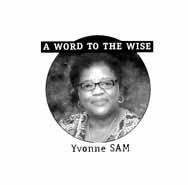
Thursday, May 20, saw Immigration, Diversity and Inclusion Minister Kathleen Weil unveiling plans for the public consultation on systemic discrimination and racism in Quebec, which is scheduled to begin in September.
The province will create different ways that would allow public participation in the consultation process, such as the launching of a website where Quebecers can answer a questionnaire and share personal stories. An additional four working groups will be created in areas where discrimination is a concern, such as work and employment, health, education, social services and housing. On completion of the consultation process, Quebec’s commission on human rights and youth rights (CDPDJ) will submit recommendations to the government, which is expected to release findings and an action plan in the spring of 2018.
There is a great temptation to become thrilled at such a gesture, but this is a temptation that the Black community should avoid at all costs; the recommendations of the Commission would not be heralding the remission of racism. Blacks still see race as being of fundamental importance, while the majority of Quebecers are of the opinion that Blacks are obsessed with race. This divide or mindset will certainly impede the attainment of enthusiastically expressed civic ideals that might unite us across racial lines in efforts to grapple with our ever-constant problems of racism and discrimination.
Holding the belief that some good day race might become an insignificant issue in our civic life here in Quebec is being naively utopian.
Another factor that the consultation process needs to take into consideration is the current and profound demographic change happening in Quebec. The arrival of thousands of immigrants at our borders will certainly be changing the face of things, not to mention attitudes.
Up to the present, Quebec has never truly confronted the narrative of racial differences, despite the known fact that discrimination remains a major issue. Instead, the province remains burdened by its history of racial inequalities and mistreatment of people based on colour, and the narrative that has been propagated to justify the mistreatment has created a kind of mist that we have all breathed in and continue to do. Although some progress has been made, we still do not talk openly about racism, we do not talk about discrimination, we do not even talk about slavery.
For example, in South Africa following the dismantling of the apartheid system, one was required to hear about the damage done by the abhorrent system.
In Berlin, Germany, one cannot walk a hundred meters or so without seeing markers, or stones or monuments placed near the residences of Jewish families abducted during the Holocaust.
So racism, and other “isms” that deny humans their full humanity and dignity continue to plague Quebec. Racism requires that the sense of revulsion that one feels be combined with an ability to impose that institutionally.
A blatant example of institutional racism lies in the justice system; random inspection (of racism in the justice system) clearly reveals that in Quebec, and the rest of Canada, the process of racism is in full operation in every aspect of the justice system.
The increase in social movements demanding racial justice are reminders that systemic racism is deeply rooted in our daily lives, and it behooves us to make sure that the institutions on which we depend for critical public services are free of systemic racism, a pervasive issue that touches all aspects of society. Consequently, it’s imperative that the Commission works determinedly across government ministries to tackle racism in all its forms.
While success cannot be guaranteed, and the one-size-fits-all approach is not a satisfactory panacea, the Black community cannot become overly complacent; we must instead strive equally hard to ensure that racism stays in remission.
Like so many stakeholders, I fervently hope that the stories and narratives told, or heard by the Commission, would be transformed into sustained and meaningful action aimed at eliminating racism and discrimination.
Plainly put, racism is economics viewed through phenomenological lens. Our socio-economic condition has served as the succinct factor underlying the racist treatment meted out to us. Blacks have no wealth and consequently no power. The dominant group knows that and also knows what course of action Blacks will take when discriminated against. We’ll march, arch, walk or talk — or both. No economy to dictate anything even the way the police handles our youth during the briefest of encounters.
Let us try to recall the last time we heard of the police either shooting or confronting Jews, Asians or Arabs.
Other forms media is another issue that needs to be addressed in the Black community, as lack of multiple forms of media have once again rendered us dependent on the mainstream culture. It is impossible to get in contact or mobilize our people in the absence of other black-owned outlets.
It is incumbent on Blacks now to tell their/our stories as a group – as fists not fingers — moving together, staying together and looking out for each other. For from here on we all have a role to play in putting an end to racism, or at best ensuring that it stays in remission or complete demission.
Aleuta — The struggle continues…














